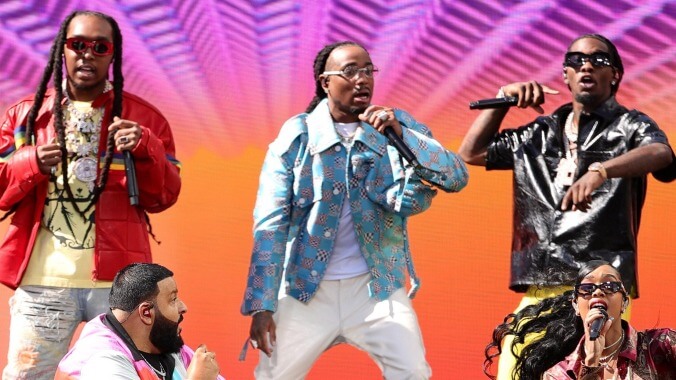There’s a reason they called themselves Migos, and it’s all over Culture III
Despite boasting heavy hitters like Drake and Cardi B, the trio's massive new record proves the three members of Migos are best when left to themselves

Culture III, the new record from ATL-based rap trio Migos, comes weighted with expectations. Individual members Quavo, Offset, and Takeoff may have been keeping busy with a bevy of solo releases and guest appearances in the ensuing time, but it’s been three and a half years since Culture II, which took the near-unanimous praise of Culture and fractured it a dozen ways, leaving fans wondering if they could recapture the magic that suffused the first installment of their album triptych. True, the record was a victim of the pandemic, resulting in this lengthy delay, but regardless of time, Culture III still comes after an extended detour into other projects, with all three rappers having explored new muses and methods than what originally brought them together.
One of the most noticeable elements of the record is the caliber of its numerous guest artists. Nearly all of them are massive stars in their own right, people whose individual track records would make them a tremendous get for any other project: Drake, Cardi B, Polo G, Future, YoungBoy Never Broke Again… hell, even Justin Bieber turns up for a surprisingly respectable hook delivery on “What You See.” Add to that a pair of rare and powerful posthumous appearances by Juice WRLD and Pop Smoke (both of whom died in the past year and a half), and you have an album in which the guest talent is arguably just as much a draw as the main act. And yet, despite the strength of nearly every guest appearance, the best parts of Culture III are the songs where it’s just Migos by themselves in the recording booth, pushing each other to ever-greater heights.
Look, it’s worth noting just how good the tracks with the guest appearances are, if only to highlight what an impressive feat it is that the Migos-only tracks maintain an intensity and insularity that push them into the forefront of Culture III. “Type Shit” features a typically electric delivery from Cardi B, one that seems to light a fire underneath Offset for his subsequent verse. “Malibu” hits its apex with Polo G’s turn at the mic, and the ethereal flutes on “Picasso” aid Future and the gentlemen in deepening and enriching the sonic palette of the record. And it’s understandable why the group would choose “Need It,” featuring YoungBoy Never Broke Again, as the closer: The song is simultaneously retro-cool and forward thinking, with it’s blend of old-school bass grooves and modernist trap flourishes, an undeniably rousing number that sends the entire thing out on an exhilarating note.
And yet. There’s a sense of intense collaboration and creative chemistry that exists when it’s just the trio of rappers by themselves, as they are on 11 of this sprawling record’s 19 tracks. (It’s impressive how cohesive it feels for such a large undertaking, far more so than on Culture II.) Right from the start, the new album puts to rest any concerns about creative stagnation. “Avalanche” kicks off with horns from “Papa Was A Rollin’ Stone,” and immediately establishes itself as one of the best things they’ve done. “Young, rich, and black / We gon’ beat the charge,” Quavo announces, and the following three minutes back it up. And “Straightenin” improves on the previous song’s Drake-assisted vibe, no mean feat. And the back-to-back-to-back, club-beckoning successes “Birthday,” “Modern Day,” and “Vaccine” (as well as Migos-only tracks like “Jane” nestled between guest spots) show that when it comes to the time-honored tradition of trumpeting capitalist success, almost no one does it with more verve and unexpected turns of phrase.
It’s too soon to say how enduring Culture III will be critically, though there’s almost zero chance its commercial success will be any less tremendous than the first two. But it may stand as a testament to the power of a tightly knit combination of artists proving they’re at their best when they stand alone. Ironically, it’s the unity of these three distinctive, idiosyncratic rappers that makes them feel as legendary as their self-mythologizing has always insisted. Like Run The Jewels or Outkast, it’s the tempestuous push-and-pull of disparate styles and strengths that generates Migos’ greatest moments—a trio of singular talents that require each others’ presence to add up to more than the sum of their parts.